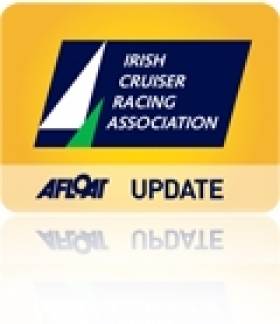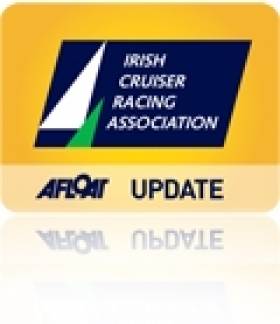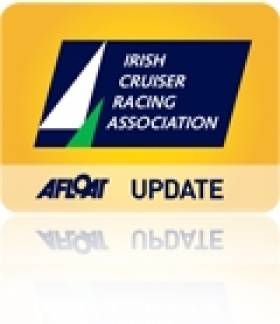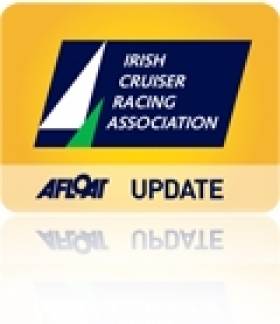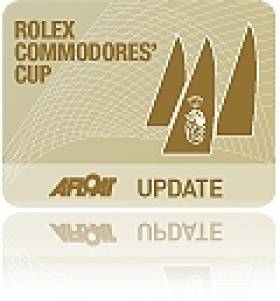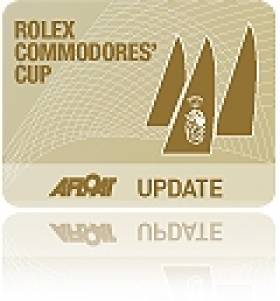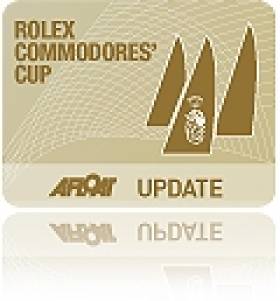Displaying items by tag: Marinerscove
Commodores' Cup Boats Jointly Awarded Boat of the Year Award
There was a strong seal of approval from sailing delegates at the ICRA Conference yesterday evening for the decision to award the Boat of the Year prize to all three Royal Cork boats from the winning Irish Commodore's Cup team.
Antix, Marinerscove and Roxy lifted the trophy to loud applause at the Carrigaline Court Hotel, the venue for ther eighth annual meeting of Irish Cruiser Racer interests. Last night Commodores Cup celebrations continued at the Royal Cork Yacht Club at a special dinner in honour of the team who brought home the cup after more than a decade of attempts.
In announcing their decision the ICRA judging team stated that as there was 'no way they could split the RCC boats that made up the winning team' this summer. The decision had been expected given the importance of the international victory in Cowes.
Earlier this month a readers poll on Afloat.ie that attracted nearly 3,000 votes showed an offshore yacht Raging Bull from Skerries to be a popular choice for the trophy. HERE. Discussion HERE. It's an indication of the widening appeal of a part of the sport that has been rekindled on the Irish Sea.
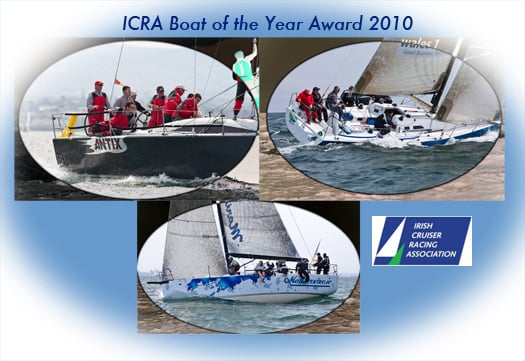
ICRA's Boats of the Year: The Cork team that won the Commodore's Cup. Montage by Bob Bateman
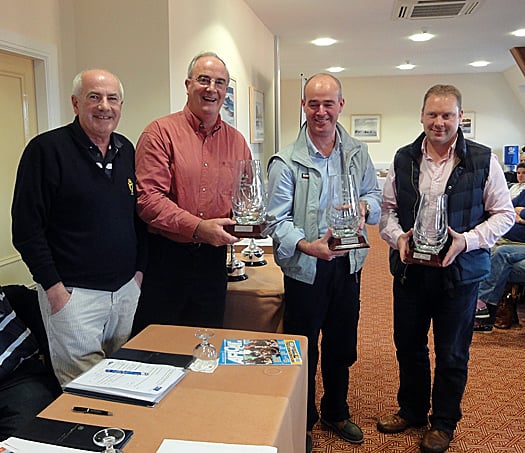
Winning Trio: ICRA Commodore Barry Rose (left) with skippers Anthony O'Leary, Dave Dwyer and Andrew Creighton. Photo by Peter Ryan
Poll Shows Raging Bull as Favourite for ICRA's Boat of the Year
With just 24 hours to go to the announcement of sailing's boat of the year award at tomorrow's Cork harbour ICRA conference the consistent poll topper from Afloat's online survey shows ISORA offshore champion Raging Bull as a clear favourite with 1175 votes. Second is Marinerscove on 873 and Errislannan third on 256 votes. Polling began just over a month ago and 2,600 votes have been cast. See the poll on the left hand column of the home page. There's still time to cast your vote to try and influence ICRA judges!
Marinerscove Takes Narrow Lead in 'Boat of the Year' Opinion Poll
Marinerscove leads Afloat's sailing Boat of the Year opinion poll that has attracted over 1700 votes to date. After 20 days of voting the lead has changed several times in the fun poll and early leader Erisslanan, who shared boat of the week with Mariners at Cork week is now in third place on 227 votes, some distance behind ISORA winner Raging bull on 607 votes. 81 votes clear ahead is the Crosshaven boat that also bagged the British IRC title this year. Dave Dwyer's Marinerscove was of course also the middle boat in the victorious Irish Commodores Cup team in August. The ICRA boat of the year award will be awarded on November 13th at the Cruiser Racer conference in Carrigaline. You can vote by using the poll on the left hand side of Afloat's home page.
Who Will Win ICRA's Boat of 2010?
Will it be Antix, Marinerscove or Roxy's year? It might be hard to ignore the sailing performance of 2010 but there have been some fine non-Commodore's cup performances too. The judges decision may well be final at the Irish Cruiser Racer Association (ICRA) conference on November 13th but before then we're taking our annual look down the likely candidates and letting YOU decide who you think should be Boat of the Year. Vote now in our Poll on the left hand column of the home page!
Unstoppable Ireland Win 2010 Commodores' Cup
Ireland has won the 2010 Commodores' Cup but it was not without final race drama this morning. According to reports from the race course, Team Captain Anthony O'Leary was in a collision before the start of the race with a French competitor when winds gusted to 30 knots.
The news that Ireland has won the Cup is already being celebrated in Crosshaven this lunch time, the home of the three boat team.
The winning Ireland team from Royal Cork was Antix, Anthony O'Leary (Ker 39); Marinerscove.ie David Dwyer (Mills 39) and Roxy 6 Robert Davies (Corby 36).
After a series of near misses in the Commodore’s Cup, there are many reasons why 2010 was entirely appropriate timing for the Irish win in Cowes this week.
Ireland fielded a single three boat team instead of its previous two and three team approach. Individual performances this season though, including a win at the British IRC Nationals were early indicators that Ireland still had the will to win the Commodore's Cup.
And it was obvious this week from the first inshore race on Sunday that Ireland would take a lot of stopping.
To send your congratulations to the Irish team click here
To join our forum thread click here
Ireland Tackle Offshore Race to Take Commanding Lead
Boats were returning to Cowes Yacht Haven throughout yesterday, back from the offshore race of the 2010 Rolex Commodores' Cup. With a 2.5x point co-efficient this race had the potential to provide a major upset in the results, but after four days of competition the Irish team hold an even more commanding lead, now up to 29.5 points. Hong Kong has regained second place, this time with a 25-point cushion over the leading French team, which in turn is just 5 points ahead of GBR Red and 15 points ahead of France Yellow in fifth.
Dave Dwyer’s marinerscove.ie was overall winner of Class 2 while team captain Anthony O’Leary’s Antix scored second place. Rob Davies Roxy 6 skippered by Andrew Creighton was fourth in Class 3.
“We’re feeling quite positive as we’ve just had one of the best offshore results ever – the lads all worked their socks off,” commented Barry Rose, Commodore of ICRA. “We’ve strengthened our lead so we’re in a good, solid position and looking forward to the rest of the regatta.”
The team had all returned to Cowes by mid-afternoon to prepare the three boats for tomorrow’s (Thursday) Rolex Trophy race on a long-inshore race that is expected to last three hours. Friday will also feature a single race as the fleet competes for bonus points in the Round Isle of Wight course.
Saturday’s single race finale counts for double-points and strong challenges from Hong Kong, France Blue and Britain’s GBR Red are expected.
“Its still all to play for. Hong Kong are looking very strong and there are a lot of points still to be earned,” cautioned Rose. “There’ll be no change in our strategy – we have a plan and we’re going to stick to it. Its about grind out the results day by day.”
Hong Kong and Ireland scored equal points in the offshore race with the former's Rockall III winning the small boat class while the latter's marinerscove.ie claimed the mid-sized class.
On the water Rockall III was first home in the whole fleet, crossing the line just to the west of the entrance to Portsmouth Harbour at 10:40:41 BST, winning her class by almost one hour on corrected time. While racing for Hong Kong, where he used to live, Rockall III's owner Christopher Opielok is German. His crew is largely from Hong Kong but also includes two Dutch, one Irishman and three Australians. According to Opielok he bought his Corby 36 specifically to compete in the Rolex Commodores' Cup, "we have been preparing for this for a long time. The boat clocked since delivery to us last year, 4,000 miles. We did a lot of offshore racing. We have four very good helmsmen. The navigation was very well prepared. We had a good tactician and I believe altogether with a very good boat, ended up with this result."
Opielok said they faced stiff competition from the Irish team's small boat, Roxy 6, "we focussed on sail trim and sailed extremely hard without any rest. We knew we could only beat Roxy upwind. We put all our effort into the 60-mile beat and then we tried to control them downwind. Luckily the tide went with us and pushed us even further than expected." The tide was particularly beneficial on the final run into the finish.
Simon Henning, owner of the Alice II from GBR White was delighted to have won the big boat division. His Farr 45, the biggest yacht in this year's Rolex Commodores' Cup does not have a favourable rating and they have not performed well in the inshore racing so far. Having to continue past Anvil Point and on to the East Shambles mark in Weymouth Bay, the Class 1 course at 191-nautical-miles was some 35 nm longer than the Class 3 version, which simply did an about-turn at Poole. Yet Alice II reached the finish line just under four minutes astern of Rockall III.
Alice led the 30-boat fleet out of the Solent in the strongest conditions of the race and enjoyed a fantastic blast down to the Owers, the easternmost mark of the course, to the southeast of Selsey Bill. "We saw 24-25 knots [of wind] and we were surfing up to 17 several times – it was lovely," commented Henning. Thanks to this they caught the tide turning at the Owers and from there never looked back. Despite the wind dropping to five knots this morning, they claimed the big boat class by a margin of 1 hour 20 minutes on corrected time.
Aside from torrential rain yesterday afternoon, conditions were not as bad as had been forecast. In the southwesterly breeze the sea was being kicked up by the wind-against-tide on the first beat out of The Solent and apart from the overfalls off St Catherine's Point, the southern tip of the Isle of Wight, it was generally considered a pleasant race.
"It was great fun - the course had a fabulous variety," commented Anthony O'Leary, who's Ker 39 Antix corrected out to be second amongst the big boats. "Every corner we went around it seemed that the tide was against us, but that was part of plan to give us a varied course with all the options and all the challenges - and there were plenty. Going into Poole Bar in the middle of the night and the Anvil in the dark is a challenge but thankfully we got away and managed to hold the thing together."
O'Leary was thankful that the Irish team had cumulatively posted a solid result in this high scoring race. "You could easily lose the regatta if you had a disaster and in that respect it is certainly satisfying. But there is still plenty to do and there are still plenty of points available. We'll keep on chipping away."
David Dwyer's marinerscove.ie maintained the impeccable Irish performance, first home in the mid-sized class, although by the slender margin of three and a half minutes over Anthony Day's Blondie IV. Tactician on the Irish boat, Andy Beadsworth, commented that, "it was a really good race and it was nice to finish relatively early today." The team enjoyed spending most of the night racing in company with the big boats. "It wasn't that lumpy. We hardly had any water over the deck!" said Beadsworth, adding that he had tried to get some sleep only to be awoken when he overheard the rest of the crew about to make decisions on deck.
Finishing behind Rockall III in the small boat class was Bernard Moureau's JND 35 Gaia in France White. Tactician Alex Mercier said that they are improving with every race aboard their new boat. "The start was a bit improvised but we were able to place ourselves well and to maintain a good position during the entire night and this morning as well." They are still discovering Gaia but have found it goes well under spinnaker.
Behind them in third was Jim Macgregor's Elan 410 Premier Flair, which posted the best result for GBR Red, with another crew who had thought they would perform better inshore than off. The line-up includes British Olympic-squad 470 sailor Ben Saxton as tactician. "It was long but enjoyable, different. It was nice weather because it was windy enough and we made good progress and we finished close to other boats so that kept it fun the whole way around," said Saxton who admits he only slept for about five minutes. Saxton reckons they made their biggest tactical gains with the tide on the beat up to Poole.
Tomorrow the Rolex Commodores' Cup returns to racing on The Solent with one inshore course scheduled for Rolex Trophy Day. Crews get a well-earned rest following their efforts of the past 24 hours or so, with the start scheduled for noon BST. With two high scoring races to follow on Friday (the x1.5 Round the Isle of Wight Race) and Saturday (a double-points inshore race) the teams at the top know this event is far from over. The Irish will sleep more comfortably tonight having cruised through the major test of the week, but undoubtedly will be on alert tomorrow to avoid the pitfalls encountered by previous compatriot teams.
Top Five Teams - Provisional Positions after completion of 5 races
Team / Points / Place
Ireland / 42 / 1
Hong Kong / 71.5 / 2
France Blue / 84 / 3
GBR Red / 89 / 4
France Yellow /99 / 5
Day Two: Ireland Has Runaway Lead in Commodores' Cup
After two further inshore races off Cowes today, the Irish Cruiser Racing Association's (ICRA) three-boat team continues to hold the overall lead of the Rolex Commodores' Cup at Cowes. The team has a 20.5-point advantage.
Team Captain Anthony O'Leary's Antix scored a first-place tied with Codiam of the France Blue team in the morning race and followed this with a second in the afternoon. Class 2 entry Marinerscove.ie fourth and second for the day while Rob Davies Roxy 6 in Class 3 had a seventh and a well-earned race win.
"It was a great days racing with tough conditions this morning in 18 knots of breeze," commented Barry Rose, ICRA Commodore. "We had a bit of a fight in some of the classes and we dug out three results with a very strong performance in the afternoon. All in all, it was a great day's work in sometimes tricky conditions."
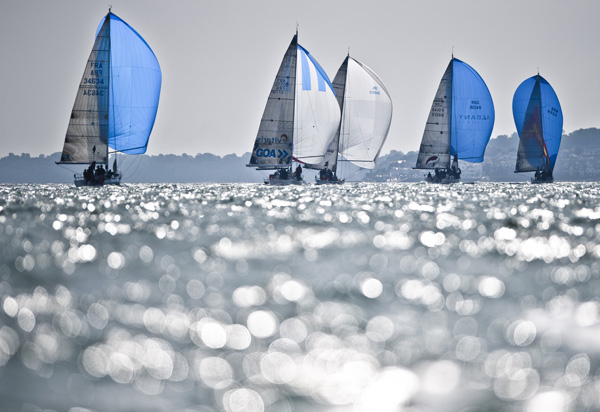
The fleet go downwind. Photo: Kurt Arriga/Rolex
The GBR Red team holds second overall with France Blue in third, just 5.5 points behind having improved from seventh overall in Day 1.
Tomorrow (Tuesday) sees the start of the Offshore Race that counts for 2.5 times the points of a normal inshore race. The course is intended to last between 24 and 36 hours in duration and by the conclusion, just over half the points for series will have been won.
"We'll put our minds to our minds to having a very positive approach to the offshore and be consistent for the duration," said Rose. "The aim is to sail strongly for the full duration – it won't be containment and we intend to keep up the intensity."
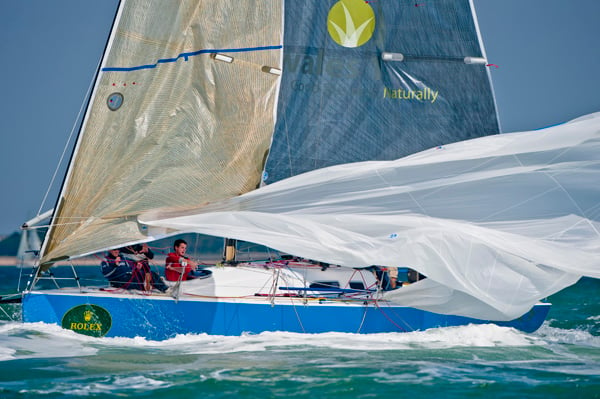
Roxy 6 douses her kite. Photo: Kurt Arriga/Rolex
Conditions were perfect for today's two races with brilliant sunshine and more breeze – 14-17 knots from the northwest for the first, dropping off to 10-15 for the second. First up was an inshore race around the length and breadth of the eastern Solent, followed by a shorter windward-leeward course set off Hill Head on the mainland shore.
In the big boat class race one saw a rare corrected time tie between Anthony O'Leary's Ker 39 Antix (IRL), maintaining her perfect scoreline for the Irish team, and Nicolas Loday and Jean Claude Nicoleau's Grand Soleil 43 Codiam in France Blue. While Antix remains the boat to beat among the big boats, it was Codiam that scored two bullets today.
"I think the conditions were ideal for our boat, which is a bit heavy and ideally needs about 15 knots," commented Nicolas Loday, racing his fourth Rolex Commodores' Cup, but his first in the Grand Soleil 43. "It is a boat that goes very well with flat water. It is not at all a boat that goes fast in the big waves or the choppy seas you get in the Channel. So today the conditions were perfect for this boat – like yesterday, but yesterday we made wrong tactical decisions. Today we kept close to the other boats and this paid off very well."
Perhaps it was coincidence, but in Class 2 another Grand Soleil 43 shone today with former RORC Commodore Peter Rutter's Quokka 8 (GBR Red) scoring two bullets ahead of UNCL Commodore Marc de Saint Denis and Géry Trentesaux's Coup de Coeur (FRA Blue) and Ireland's marinerscove.ie, belonging to David Dwyer. Quokka 8 rates at 1.103 under IRC compared to Codiam's 1.110 as the French boat has a larger sail plan.
"We didn't feel on fire yesterday losing one race by 6 seconds and another one by less than a minute," explained Peter Rutter. "We needed to sit down and think - we did that last night and it's come out fantastic. We have a different way of trimming the main and we are also making sure that people only stop hiking out when given permission to. So, a bit more dictatorial, but it worked really well and the crew felt really happy."
Rutter felt their performance today was to down the change in crew work rather than having the ideal boat for the conditions. "It wasn't that different from yesterday, a little more wind. We stopped being stupid really."
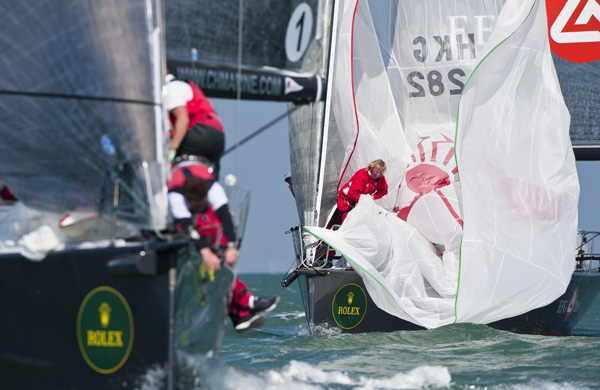
Antix jostles for position downwind. Photo: Kurt Arriga/Rolex
In the flat water and moderate conditions, the smaller higher-rated boats did seem to suffer today. Marinerscove.ie the Class 2 boat from the all-powerful Irish team struggled to post a 4-2. "We are in a 39-foot boat racing against 43-foot boats which rate significantly lower than us - it is very hard for us especially in the medium to upper wind ranges," commented her tactician, former America's Cup helmsman Andy Beadsworth. "After the first race we said 'we sailed well, for sure we could have done some things cleaner and smarter, but we were never going to beat those guys'. That was the reality."
In the second race Beadsworth was particularly pleased when his call to go left up the first beat came good, despite dissenters on board. They ended up reaching the weather mark a minute ahead of the competition.
The South African team is still trying to get out of its own way, lying seventh equal with GBR White after day two. Their mid-sized boat, Mike Bartholomew's King 40 Tokoloshe has been based in the Solent for two years, but Bartholomew says they have been struggling to get off the line cleanly. "It is essential in this type of racing. The races are being won and lost in the first 30 seconds. We have had four races where we haven't done that and we are paying the price. It has been very tight racing. We are disappointed we haven't done better than we have. We know what we are doing wrong and it is a case of trying to correct it."
In Class 3 Marc Alperovtich and Jerome Huillard's A-35 Prime Time won today's first race for France Yellow, while Robert Davies' Roxy 6 took the second for the Irish. But once again it was France Blue that came to form with Samuel Prietz' X-40 Goa claiming second in both today's races.
"Yesterday we had some minor difficulties with boat handling," admitted Prietz, a past Codiam crewman, for whom this is also his fourth Rolex Commodores' Cup. "We haven't sailed together since June, so yesterday we didn't do so well. We missed a couple of opportunities in tactics, also we were not able to point high enough comparing to some other boats - so not really promising. Today we sailed much more relaxed, with a much better mood inside the team."
Tomorrow, the complexion of the Rolex Commodores' Cup changes with the start at 10.30 BST of the 24-36-hour offshore race. The weather is also expected to take a turn for the worse with the passage of a front tomorrow afternoon. According to meteorologist Mike Broughton, working with the Irish team, this will bring with it 20-plus knot winds, before conditions lighten on Wednesday night, and then fill in again on Thursday. "It means it won't be a complete lottery. There will be no thermal switch off," he advises.
Offshore in waves with a mix of wind conditions, along with the rigours of racing at night, maintaining focus with little or no sleep, perpetually on the rail, after up to 36 hours of racing – will a new group of boats come to the fore? Past experience indicates that the French and British teams have proved strongest in the Rolex Commodores' Cup two-and-a-half points scoring offshore race. And, if there are stronger gradient winds - will the Irish continue to be the class act? We will not have the final answers to these questions until Wednesday, but by tomorrow night we may some pointers. All yachts will be carrying tracking units with the positions presented at: http://commodorescup.rorc.org
Top Five Teams - Provisional Positions 16/8/10
Team / Points / Place
Ireland / 24.5 / 1
GBR Red / 45 / 2
France Blue / 51.5 / 3
Hong Kong / 54 / 4
France Yellow /59 / 5


























